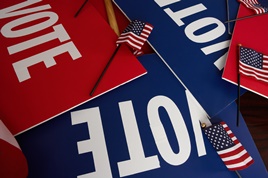 President Trump announced last week via U.S. Attorney General Jeff Sessions that he is ending the Deferred Action for Childhood Arrivals (DACA) program that President Obama instituted in 2012 by executive order. DACA allows for certain illegal immigrants who entered the country as minors to receive a renewable two-year period of deferred action from deportation and eligibility for a work permit.
President Trump announced last week via U.S. Attorney General Jeff Sessions that he is ending the Deferred Action for Childhood Arrivals (DACA) program that President Obama instituted in 2012 by executive order. DACA allows for certain illegal immigrants who entered the country as minors to receive a renewable two-year period of deferred action from deportation and eligibility for a work permit.
Under this decision, the U.S. Department of Homeland Security will rescind the executive order that established DACA and not accept new program applicants. It puts 800,000 “dreamers” (including an estimated 10,000 Hoosiers) – children who arrived in the U.S. illegally with their parents at a young age – into legal limbo until it takes effect March 2018. This is an unfortunate turn of events for a demographic group where 90% are either in college or working.
As a result, 15 state attorneys general (all Democrats) filed suit this week to block the President’s plan to end DACA.
During the announcement, Sessions commented that actions under the Obama administration were unconstitutional and that the program should be enacted by Congress. Even Sen. Dianne Feinstein (D-CA) implied that President Obama’s executive order to protect young immigrants brought here as minors was on shaky legal ground and that is why Congress must act.
Over the next six months, President Trump is counting on Congress to do just that and essentially fix the DACA situation once and for all.
The Indiana Chamber believes lawmakers must address the issue as part of a larger immigration reform package, but it remains unclear whether both sides can compromise to reach a solution. Some are adamant that they will not accept any deal to fund even small amounts of a border wall or increased immigration enforcement, and cuts to legal immigration would be unacceptable. Other members of Congress are saying you need to pass this as part of border security, while a contingent believes you need to pass this on its own – which makes the possibility of its success very difficult.
On Wednesday, Sen. Tom Cotton (R-AR) said he was open to adding legal status for DACA recipients to his RAISE Act legislation – the goal of which is to build a skills-based immigration system similar to Canada or Australia while decreasing the amount of legal immigration overall.
Indiana’s senators Joe Donnelly and Todd Young reacted to the DACA news.
“Our country is still in need of reforms to fix our immigration system and strengthen border security, but in the interim we should pass bipartisan legislation to give these young people, who were brought here through no fault of their own, some stability and clarity,” Donnelly said.
“Upending existing protections for the nearly 10,000 young people in Indiana who have been here for most of their lives isn’t the path we should take.” Young stated: “I continue to believe we must secure our southern border and fix our broken immigration system. Irrespective of (the Trump) announcement, that requires a bipartisan solution in Congress that reforms our legal immigration system, prevents illegal immigration and addresses the question of what to do with undocumented men, women and children already here.”
BACKGROUND
So how did we get to this point with DACA and immigration? It’s been many years in the making. Attempts to address illegal immigrants who entered this country as minors date back to as early as 2001.
In 2007, the DREAM (Development, Relief and Education for Alien Minors) Act was introduced in the Senate. The Act allowed for a process by which qualifying alien minors would first be granted conditional residency. Eventually, by meeting further qualifications, permanent residency status could be obtained. It failed to be brought up in debate for lack of a filibuster-proof 60 votes. In 2009, it was reintroduced in both the Senate and House, and provided for qualifying immigrants who were between the ages of 12 and 35 at the time of enactment; who arrived in the U.S. before 16 years of age; resided continuously in the U.S. for five years; graduated from high school or obtained a GED; and were of good moral character. The bill continued debate into 2010 when the House passed a version, but the bill again failed to reach the 60-vote threshold in the Senate. Unsuccessful attempts were made in 2011 as well.
As a result of Congress’ inability to pass legislation, the Obama administration by executive order implemented the policy position of DACA in June 2012.
In 2013, the U.S. Senate’s “Gang of Eight” passed a comprehensive immigration reform bill in the Senate. In 2014, the House indicated it had the votes to pass the bill. However, when House Majority Leader Eric Cantor lost his primary election, House Speaker John Boehner announced that the House would not bring the bill to a vote. As a result, President Obama promised to fix the immigration system as much as possible on his own without Congress and attempted to expand DACA to include the parents (known as DAPA) of these minors. In a memorandum to ICE (U.S. Immigration and Customs Enforcement), aliens without criminal histories were to be made the lowest priority and that illegal immigrants who are the parents of U.S. citizens or lawful permanent residents were to be granted deferred action.
Subsequently, the Texas attorney general – joined by 25 other Republican-led states, including Indiana – sued in federal court in Texas to prevent implementation of the expansion. The case eventually worked its way to the U.S. Supreme Court and in June of 2016, a deadlocked 4-4 decision stated that: “The judgement is affirmed by an equally divided court.” The ruling set no precedent and simply left in place the lower court’s preliminary injunction blocking the program.
Earlier this summer, on June 15, 2017, then Homeland Security Secretary John F. Kelly signed a memo rescinding DAPA. At that time, it was clarified that the memo did not include DACA and the Trump administration had not decided on whether it would keep that policy in place.
Which brings us to action last week on September 5. Attorney generals from nine states – led by Texas – notified the Justice Department that they would amend the current DAPA lawsuit to include DACA if executive action wasn’t taken by September 5 to phase it out, which prompted the announcement by U.S. Attorney General Jeff Session.

 President Trump announced last week via U.S. Attorney General Jeff Sessions that he is ending the Deferred Action for Childhood Arrivals (DACA) program that President Obama instituted in 2012 by executive order. DACA allows for certain illegal immigrants who entered the country as minors to receive a renewable two-year period of deferred action from deportation and eligibility for a work permit.
President Trump announced last week via U.S. Attorney General Jeff Sessions that he is ending the Deferred Action for Childhood Arrivals (DACA) program that President Obama instituted in 2012 by executive order. DACA allows for certain illegal immigrants who entered the country as minors to receive a renewable two-year period of deferred action from deportation and eligibility for a work permit. Charlie Cook is editor and publisher of the
Charlie Cook is editor and publisher of the 
 According to
According to  Longtime WTHR-TV political reporter Kevin Rader says he picks up “ripples” on Twitter or Facebook about posts that are gaining steam, getting retweets and likes, that make him take notice to a certain policy or official’s statement. “It’s almost like an immediate Nielsen Report that comes to your desk every day that you can look at and say, ‘Oh, this is interesting … or this is interesting,’ ” he notes.
Longtime WTHR-TV political reporter Kevin Rader says he picks up “ripples” on Twitter or Facebook about posts that are gaining steam, getting retweets and likes, that make him take notice to a certain policy or official’s statement. “It’s almost like an immediate Nielsen Report that comes to your desk every day that you can look at and say, ‘Oh, this is interesting … or this is interesting,’ ” he notes. Indiana Business for Responsive Government (IBRG)
Indiana Business for Responsive Government (IBRG) Over the years, we’ve met, interviewed and evaluated hundreds of candidates for the Indiana Chamber’s non-partisan political action program,
Over the years, we’ve met, interviewed and evaluated hundreds of candidates for the Indiana Chamber’s non-partisan political action program,